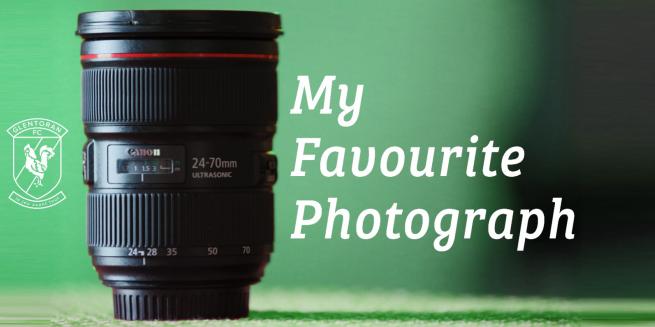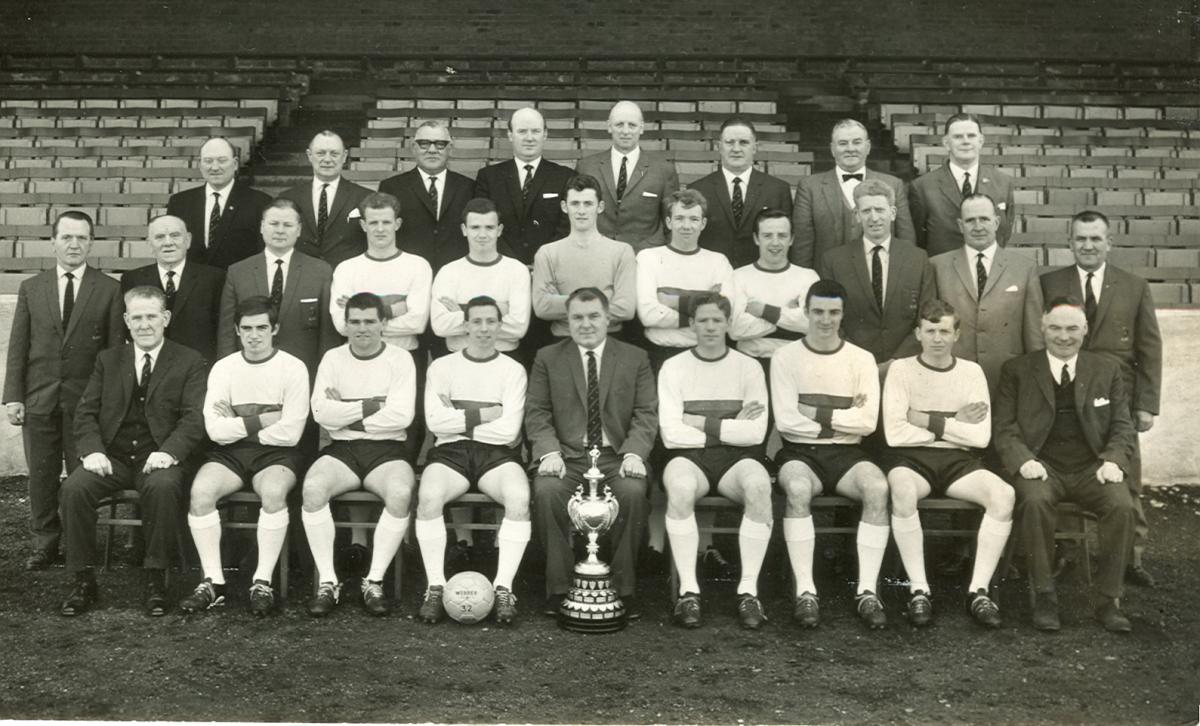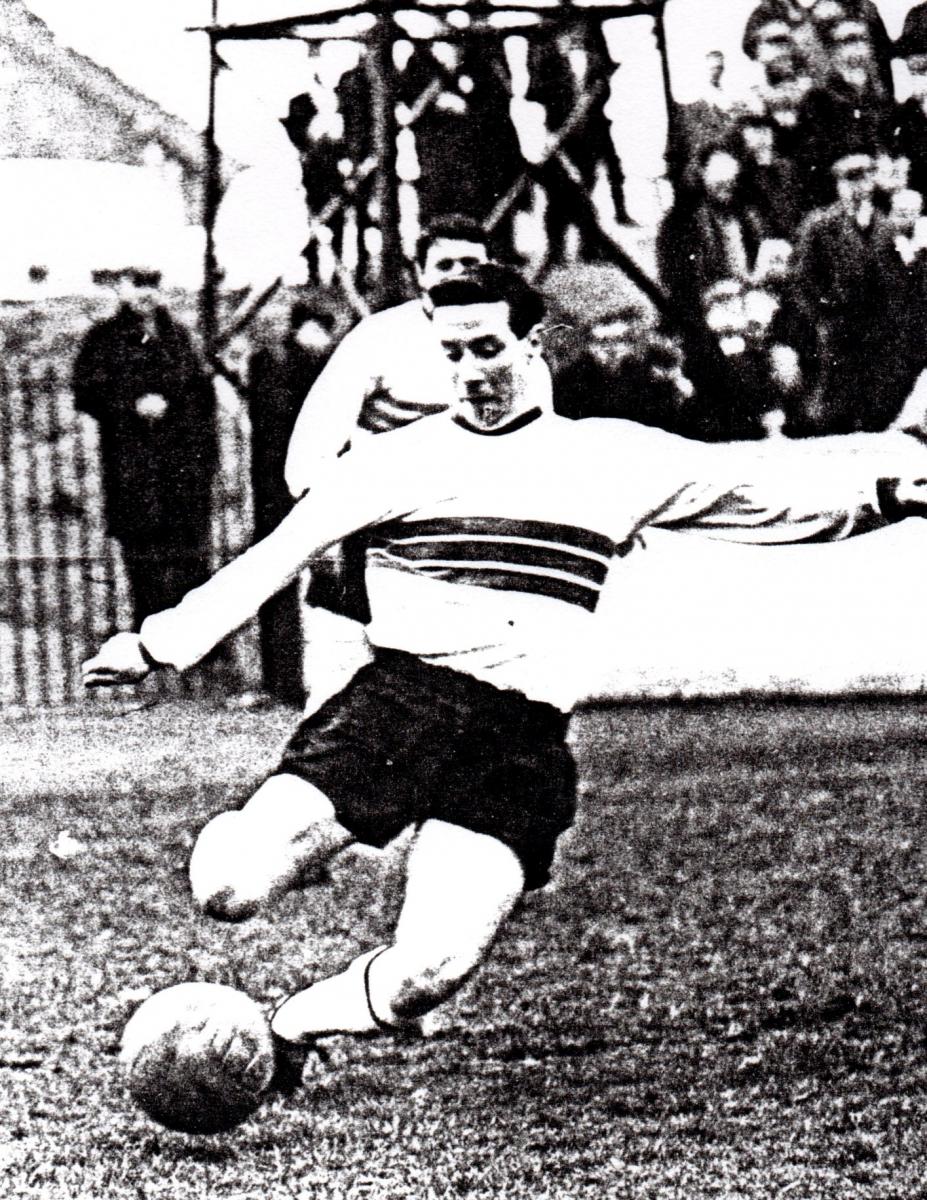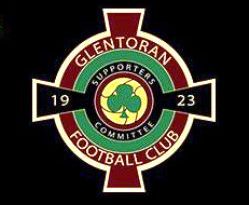
This is the fifth in a series of interviews with former Glentoran players and managers where they talk about a photograph that means a lot to them. Some will be reproduced from a series written by Brian McClelland for the Glentoran Gazette in the mid-1990s with other, newer stories we will be writing over the next few weeks. This one was published in the Gazette when Brian spoke to the late Walter Bruce, one of Glentoran's greatest servant of the 1950s, 60s and early 70s.

No wonder I have a smile on my face in this 1966 Irish Cup Final photograph. It was a case of third time lucky because I had played in two losing finals – against Distillery in 1956 and Derry City in 1964.
Victory was all the sweeter as our opponents that day were arch rivals Linfield. The newspapers called it “Conroy’s Cup” because young Terry Conroy,, later to play for Stoke City and the Republic of Ireland, scored both goals, but in truth it was a real team effort of which, as team captain, I am very proud.
Also in the picture are team mates Roy Borne (left), Harry Creighton and manager Billy Neill. Trainer Bobby McGregor is at the front right.
I was only eighteen years old when I played in that 1956 final. Manager Frank Grice selected me for the second replay, the first two games having been drawn! We lost 1-0 and I can remember feeling very disappointed as we had some excellent players on the team including Billy Neill, Sammy Lowry and Ambrose Fogarty.
How did I come to sign for the Glens? Well, I was a message boy for Glentoran director Bob Fleming and he invited me to the Oval for a trial after watching me play for Boyland. As a fifteen year old I found it difficult to make an impact so I went to East Belfast, winning a couple of youth caps, before rejoining the Glens in 1954.
To put my career with Glentoran in a nutshell, I have won every medal in local football, with the exception of the County Antrim Shield. Ironically, my son Ian who was with the Glens for spell, was a member of the Carrick Rangers team which defeated the Glens in the Co. Antrim Shield final of 1992. Thus a Shield medal legitimately found a home in the Bruce household. I say legitimately because one of my keenest rivals on the football pitch, Isaac Andrews of Linfield, gave me one of his Shield medals when I left home to try my luck in the United States. Who says there’s no sentiment in football?

Billy Neill's 1966 Irish Cup winning team with Walter (ball at his feet)
Since I have mentioned son Ian, it would be remiss of me not to say a few words about my other two sporting sons – Stewart, who won the 1500 metres in the 1992 NI Swimming Championships, and Neale, who played football for Bangor Amateurs.
I’ve represented the Irish League quite a few times, but one game in particular stands out quite vividly in my memory. It was against the Football League at Blackpool in October, 1960. The Football League side chosen for the game should have been called “Great Britain” such was its composition and strength. Four of the famous Spurs double winning side, Danny Blanchflower, Dave Mackay, John White and Cliff Jones played as did Burnley left wing duo of Jimmy McIlroy and John Connelly. The forward line was led by Dennis Law, at the time the highest-priced player in British football, and in goal was Bert Trautmann, the former German prisoner of war who was one of the greatest goalkeepers ever seen. Even the referee was famous – World Cup whistler Arthur Ellis!
We were undaunted by this most formidable array of talent because we had our own stars in Jackie Milburn (Linfield and Newcastle), Geoff Twentyman (Liverpool and Ballymena) and Fay Coyle (Coleraine). We lost 5-2 which was no disgrace, but the speed of the game and the class of the players made a lasting impact on me. I may have just been across the water in Blackpool but for a wee lad like me from east Belfast it was a remarkable football journey.
The occasion was a great stage for me to show that I could perform in the top flight. I reckoned that I had not let myself down and this was confirmed by the next day’s newspaper reports. It was disappointing, therefore, when none of the English clubs made an offer for me. Burnley, the club that bought Alex Elder and Jimmy McIlroy from Glentoran, expressed an interest but nothing concrete materialized.
Previously, when I was with Boyland, Manchester United were keen to have me at Old Trafford, but my father, quite properly, turned them down because I had just started an apprenticeship in the shipyard as a fitter.
Not long after the game against the Football League, I received my first international cap against Scotland at Hampden Park, coming in at inside-right for the injured Jimmy McIlory. I was delighted to receive a telegram from Jimmy before the game, wishing me the best of luck. We lost 5-2 and it was to be seven long years before I was capped for the second and last time against Wales (0-0) at Windsor Park.
The sixties was an exciting time at the Oval with European Cup games against classy opposition like Real Zaragoza, Arsenal, Benfica, Panakthanaikos and Glasgow Rangers. For the Benfica tie at home we knew our only chance was to play the ball on the ground and try to keep possession. We played with great belief in ourselves and set off for the return leg in Lisbon protecting a 1-1 draw.
John Colrain, who had left early to watch Benfica play on the Sunday, met us at the airport bubbling with confidence. “We’re going to beat this lot”, he forecast. Sadly, a 0-0 draw meant that we were eliminated on the away goals rule.
We felt that the referee had robbed us of a famous victory by not awarding a penalty kick when Johnny Johnson was pulled down in the box. The Benfica crowd showed their displeasure at their own team’s performance against a bunch of part-timers by pelting them with cushions.
Believe it or not, during my sixteen years at the Oval I played under thirteen different managers – a fact that is surely worth a mention in the Guinness Book of Records! I missed out on Alex Young’s brief period when I went to the States or it would have been fourteen! My managers included Ken Chisholm, Tommy Briggs, Harry Walker, Isaac McDowell, Gibby McKenzie, Billy Neill and John Colrain.
For my money Billy Neill was the best of the lot. John Colrain achieved much success, but had inherited a fine squad of players from his predecessor, Billy Neill.
After our extremely successful tour of the States as the Detroit Cougars in 1967, I left the Glens early in 1968 to play for the Cougars in the North American Soccer League. We went to Jamaica for pre-season training and on to Haiti where we played three games against their top sides and national team. I had the dubious honour of meeting the infamous Haitian dictator “Papa Doc” Duvalier.
Unfortunately for me, Detroit folded after little over a year. I had intended to sign for the Washington Whips, along with our Hungarian coach, Nagy, and John Kerr, whose son played for Linfield and the USA a few seasons ago. But I was injured in the last game against New York Cosmos and decided to return home.
Bertie Peacock wanted me to sign for Coleraine, but I was a Glenman at heart and naturally signed for the Glens, then managed by Peter McParland. I had played with McParland in the Northern Ireland team in 1960 and against his team, Atlanta, in the States.
After I retired in 1971, I took over the running of the Colts and then the Seconds for a number of years. Reluctantly, I gave up my involvement at the Oval when my shop on the Holywood Road began to demand much more of my time.
Looking back on a career spanning three decades – from Hampden park, Glasgow to the Yankee Stadium, New York, from the Stadium of Light, Lisbon to Highbury, London – I value most the many good friends I have made through the greatest game. As the photograph shows, football can bring the joy of victory, but it may also bring the pain of defeat, which players and fans alike must learn to accept in a sportsman-like fashion, with dignity and good humour.






